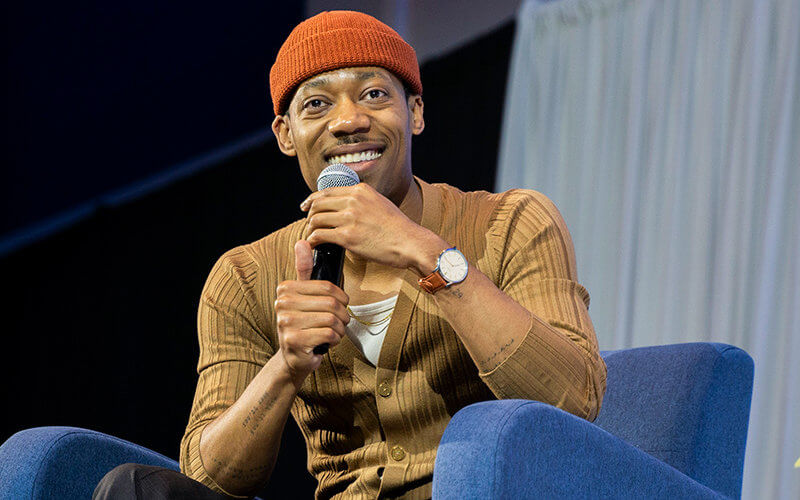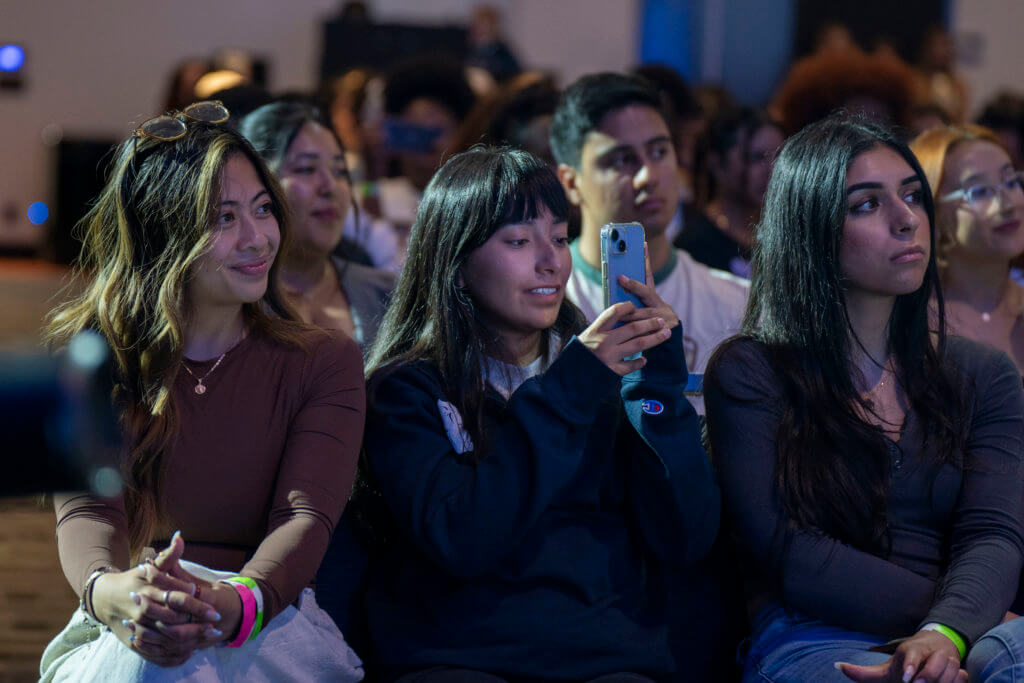
When he first saw the 1997 sci-fi blockbuster “Men in Black,” 4-year-old Tyler James Williams giggled as intergalactic creatures chased after a secret agent played by Will Smith.
Comedy captivated him. “The fire that was lit that day is what has kept me in comedy over and over again,” said Williams, an award-winning actor, musician, songwriter and producer who participated in Cal State Fullerton’s “Beyond the Conversation” series. Hosted by Associated Students Inc. and the Division of Student Affairs, the series invites speakers to campus to engage students in dialogue about diversity, equity and inclusion.
Williams’ commitment to embodying characters that showcase a “thread of emotional vulnerability” and compassion, allows him to tell powerful stories while tugging the audience’s heartstrings.
His notable roles include Chris in “Everybody Hates Chris,” Cyrus in “Let It Shine,” Lionel in “Dear White People” and Noah in “The Walking Dead.” Williams received the 2023 Golden Globe Award for Best Supporting Actor for his role as Gregory in the hit series “Abbott Elementary.”
Romanticizing the ‘Art of Teaching’
Turning down more acting roles than picking them up, Williams said he finds joy in playing supporting roles that “have a lot of heart.”
In the fictional, underfunded Philadelphia public school of “Abbott Elementary,” teachers scramble to support their students’ academic success and make a sustainable living from paycheck to paycheck.
Exposed to the inequities in the United States’ educational system, Williams shared he is more informed of the plight of teachers around the country and “hyper-aware” of his duty to humanize teachers’ lived experiences.
“On the grander scale, as a country we’re understaffed with teachers, but specifically with teachers of color and even more Black men,” said Williams. “I’m advocating for Gregory Eddie, for that position to be filled, inviting Black men into the conversation and romanticizing the true art that is teaching.”
“Abbott Elementary” wrapped three seasons with 59 episodes, and Williams shared that the show will return for a fourth season.
Williams explained his draw to comedy as an antidote to negative national news.
“People don’t change when they feel angry. You have to disarm them,” said Williams. “It’s like when you’re on a date with somebody and one of the first things you want to do is make them laugh. It makes them comfortable enough to talk about difficult issues if they understand that they are not under attack.”
Williams’ hilarious side-eye glances to the camera in “Abbott Elementary” are not scripted but improv. He shared that the ability to gauge timing and specificity in acting will “open doors” for students.
Looking back on one of his first roles, Williams said “Everybody Hates Chris” provided the “best training ground” for his professional career.
“I did scenes with some of the best stand-up comedians in history,” said Williams. “I was able to stand 10 toes with Chris Rock.”

Opening Doors in Entertainment
Alongside Williams’ diagnosis of Crohn’s disease at 24 years old, he shared he is diligent about his mental health. Williams emphasized the importance for students to “protect their peace” and form an unbreakable mind-body connection.
For aspiring actors, he said it’s crucial to fall in love with the camerawork, preparation and character development.
“Work on yourself as a creative and work on being surefire. Later in your career, you are going to make bigger choices,” said Williams. “That’s what’s going to help you be a precision sniper as an actor versus somebody who does a big song or dance.”
Before the COVID-19 pandemic, Williams wrapped filming “The United States vs. Billie Holiday,” a film that follows the Federal Bureau of Narcotics as they target jazz singer Billie Holiday for her song “Strange Fruit,” which airs the atrocities of the Jim Crow era.
To immerse himself in the role of saxophonist Lester Young, Williams had to separate his feelings from reality.
“I was playing a character who actually existed. It raises the stakes a lot more,” said Williams. “You’re not just telling a story; you’re telling someone’s story. There’s a responsibility to tell it the right way.
“Our job is to humanize the stories of those who don’t get humanized.”